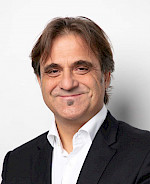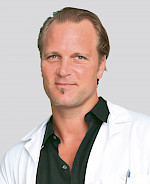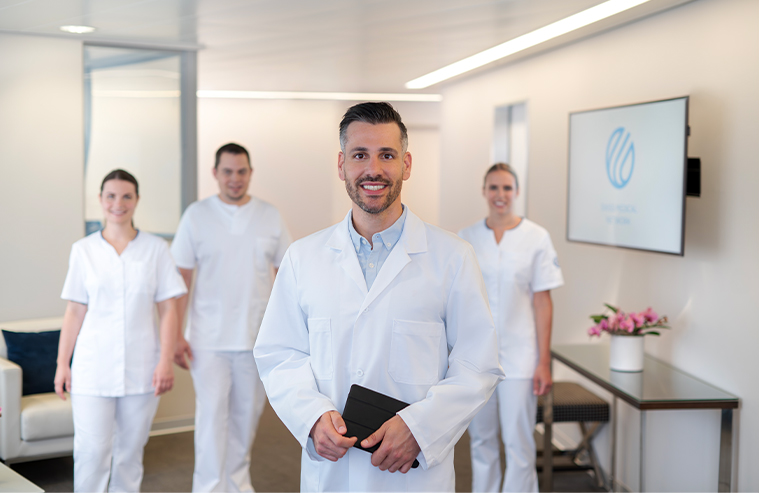
Rotator cuff rupture
The rotator cuff is a sheet of tendon in the shoulder joint. It encloses the head of the upper arm like a hood and connects the shoulder girdle muscles to the upper arm.
Rotator cuff tears can occur as a result of an accident or previous degenerative damage.
Symptoms
With a chronic rupture, pain occurs mainly at night or during exertion. The individual will experience a significant reduction in strength, especially when working with their arms overhead.
If the rotator cuff tears, the arm will lose function.
Because the shoulder girdle muscles have an extraordinary ability to compensate, the stability may return to normal, but the pain persists.
Severe pain occurs especially at night because being laid down pulls the humeral head up and the injured cuff gets trapped under the outer edge of the shoulder blade (the acromion).
Causes
A rotator cuff tear can have a number of causes, including an accident, a fall, or lifting something that is too heavy. In young people, tendon rupture in the shoulder joint usually occurs as the result of an accident.
However, in most people, the damage can be traced back to wear, as the ageing process causes the tendons to lose stability. Often, it only takes a simple forceful movement or a minor fall to permanently injure the already damaged tendon.
Diagnosis
Sonography and an arthro-MRI scan are used to determine whether it is a rotator cuff tear.
Treatments
Conservative therapies
Rotator cuff tears are only treated surgically.
Surgical treatment
In the past, these types of injury were rarely operated on. Unfortunately, the post-operative results were insufficient.
Today, however, it is recommended to operate on the tear as early as possible, as it is known that the tear will not heal by itself and the longer you wait, the larger the lesion becomes, eventually making the operation very difficult.
The larger the defect to be treated, the more difficult the procedure becomes and the less easy it is to assess the result.
Rotator cuff surgery is minimally invasive, i.e. arthroscopic. Four to five small incisions are made, through which the arthroscopic devices are inserted. These devices are used to remove the inflamed tissue and put the tendon back in place. Very small implants are used to attach the end of the threads to the head of the humerus, so that they can gradually grow into the bone.
Aftercare
After the operation, physiotherapy is carried out for four to six weeks to mobilise and exercise the shoulder joint. During this time, an orthosis should be worn to stabilise the joint.
Pain can occur for up to eight weeks after surgery. Once the pain has subsided, the patient can return to work. They can also resume driving. After twelve weeks, unrestricted exercise is possible.
FAQs
How long does a rotator cuff injury last for?
Depending on the course of treatment and aftercare, the recovery time is between six and twelve weeks.
How long does pain last for after rotator cuff surgery?
In some cases, the patient may still be experiencing pain several weeks after the operation. How severe and how long the pain lasts depends on the scope of the procedure.
What happens if a rotator cuff rupture is left untreated?
Failure to address a torn tendon in the shoulder can result in irreparable damage to the rotator cuff. In serious cases, this may eventually mean that an artificial shoulder joint has to be used.





